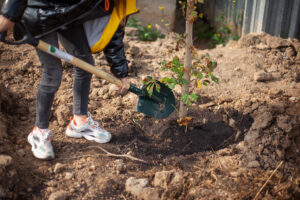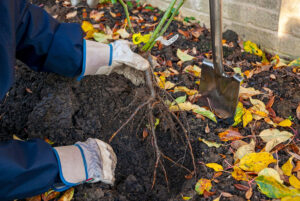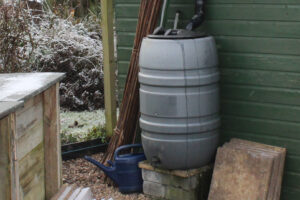Four gardening tips for winter
Though it may be raining or frosty outside, winter is the best time to prepare the garden for next summer and reduce the impact of any dry spells. Horticultural scientist Janet Manning shares these tips to make the most of the moisture that’s around and reduce the amount of watering needed next year.
1. Hollow tining your lawn
 Grass is the only plant that we regularly walk over, but our walking compacts the soil underneath it. Hollow tining or coring is the removal of cores from the lawn, and it is best done before the spring, when the soil is moist, but not waterlogged or frozen. It is a very good way to aerate and relieve compacted turf, allowing it to expand, receive more air and more easily absorb water. The oxygen in the air is important to keep the soil microorganisms alive, as they help the rain to infiltrate the soil. All this makes the lawn more resilient to periods of drier weather.
Grass is the only plant that we regularly walk over, but our walking compacts the soil underneath it. Hollow tining or coring is the removal of cores from the lawn, and it is best done before the spring, when the soil is moist, but not waterlogged or frozen. It is a very good way to aerate and relieve compacted turf, allowing it to expand, receive more air and more easily absorb water. The oxygen in the air is important to keep the soil microorganisms alive, as they help the rain to infiltrate the soil. All this makes the lawn more resilient to periods of drier weather.
2. It’s tree planting season
 Most trees can be planted at any time of the year, but it can be hard work watering them when they haven’t grown an established root system. By planting in winter, the roots can find the water they need, rather than rely on your watering. Planting them now will also get the roots growing so that they’re ready to draw on deeper soil moisture come the spring, when the buds break, and always add a generous layer of mulch to reduce surface evaporation.
Most trees can be planted at any time of the year, but it can be hard work watering them when they haven’t grown an established root system. By planting in winter, the roots can find the water they need, rather than rely on your watering. Planting them now will also get the roots growing so that they’re ready to draw on deeper soil moisture come the spring, when the buds break, and always add a generous layer of mulch to reduce surface evaporation.
Trees may need watering through dry spells however, for the first few years.
3. Plant bare-root plants
 Bare-root plants are grown in open ground and come without a pot. Most are hardy varieties of perennials, and if you plant them in winter they can establish root growth, needing less watering come the spring. When you receive your plants, soak them in a bucket of cold water for a couple of hours. Plant them straight away or within a few days, as long as the soil is not waterlogged or frozen.
Bare-root plants are grown in open ground and come without a pot. Most are hardy varieties of perennials, and if you plant them in winter they can establish root growth, needing less watering come the spring. When you receive your plants, soak them in a bucket of cold water for a couple of hours. Plant them straight away or within a few days, as long as the soil is not waterlogged or frozen.
4. Fix up a water butt
 If you haven’t got a water butt there’s still time to collect the rain over the winter. Rain water is great for your garden as it is softer, contains nitrates, and has less salts and chemicals than tap water. So keep rain out of the drain and on your plants. Just make sure that if you are using a rainwater diverter, it needs to be installed level with the top water level in the water butt, not higher than the butt.
If you haven’t got a water butt there’s still time to collect the rain over the winter. Rain water is great for your garden as it is softer, contains nitrates, and has less salts and chemicals than tap water. So keep rain out of the drain and on your plants. Just make sure that if you are using a rainwater diverter, it needs to be installed level with the top water level in the water butt, not higher than the butt.
Grow better plants more easily
Making the best use of water in the garden saves time and helps grow better plants. Check out our gardening blogs and tips for heaps of information and insight that you’ll be able to use straight away.
Back